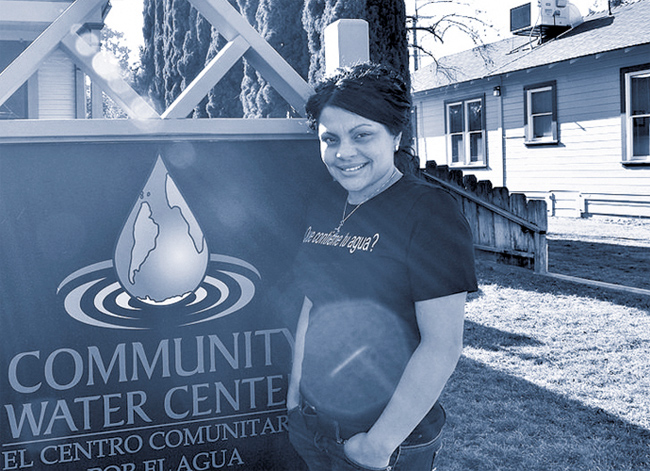The following article was written by Sarah Mirk for Yes Magazine and posted May 12, 2015:
California is running dry. The drought continues to gain national attention with its fourth year of record-low rainfall. But to many people living in mostly rural, low-income communities, water scarcity is nothing new. One and a half million Californians have toxic, fertilizer-laced water pouring from their taps—runoff from farmland that brings in $35 billion annually for the state in agriculture. And Latino communities—83 percent of farmworkers are native Spanish-speakers—are disproportionately affected by polluted water.
Water issues hit home for activist Susana De Anda. She grew up among farmworkers in California’s Central Valley and now campaigns for clean, affordable water as co-executive director and co-founder of the Community Water Center. De Anda and her team have leveraged that spotlight on the unending drought to help pass significant water-rights laws, including the first law in the nation that declared safe and clean water as a human right. Last year, in another victory, the state passed a law requiring local governments to sustainably manage their own groundwater—underground water that wells tap into and which make up a third of California’s water supply.
This spring, California Governor Jerry Brown made headlines when he called for reducing residential and business water use by 25 percent. In a state that’s thirsty for change, De Anda is working for communities who need relief the most.
Sarah Mirk: In college, you earned a degree in environmental science and geography. What was your path from science to community organizing?
Susana De Anda: I come from a farmworker family and I went to school not to avoid working in the fields, but to ensure that we provide respect for those that do work in the fields. When I graduated, my first job was as a community organizer, which was life changing. I learned about social infrastructure and that people can actually create change once they organize. It’s not OK to live in fear of becoming sick if you drink tap water. It’s not OK that our children go to school with water fountains that don’t produce safe drinking water. When you realize that’s not OK and that it’s not happening in wealthier communities, you start to think, “How do we change it?”
Mirk: Growing up in a family of farmworkers, did you think about water rights? How was water a part of your life as a kid?
De Anda: Interestingly enough, my grandfather always showed a respect for rain. My family is from Mexico, and I would go there every summer. Every time it would rain, there were a lot of prayers given out. Even in the local church, the priest would pray and be grateful when it would rain, because in Mexico there’s [very little] irrigation. I grew up in a community of paying a lot of respect to water and the way we use water. Going to school, I ended up working with the Santa Barbara County Water Agency as a Spanish-language spokesperson. Water has been an issue that I just gravitate toward—we can’t be so disconnected from it because we need it to survive.
Mirk: Tell me about the water issues you were working on before the drought hit four years ago.
De Anda: More than a million people in California are exposed to illegal and unsafe levels of contaminated tap water. There are studies that show that if you are low-income, a person of color, and you live in the Central Valley, you’re going to have higher chances of having polluted water. In the Central Valley, a lot of people have arsenic, uranium, and nitrates in their water. You can’t even smell it or taste it; you have to be informed that it’s in your drinking water. So hardworking families are paying twice for water. Once, for water they can’t use, and then again, having to spend up to 10 percent of their household income just on drinking water. Our poorest are paying the highest, most expensive water bills for toxic water. Here at Community Water Center, we believe that clean water is a basic human right and it should not be a privilege. No matter where you live, you should be able to drink a glass of water from your home without worrying that you’re going to become sick. Three years ago, we passed AB-685, a state law that says all Californians need to have access to safe drinking water. It prioritizes funding and resources to those who don’t have access to clean water. It’s the first law in the country that exists, and is very indicative of the reality that we live in. Water is complex, but at the end of the day, it is very basic. It should be clean for human consumption, and that needs to be a priority. Now you add the layer of the drought. People who have the ability and resources to drill deeper into our aquifers or drill a new well are usually wealthier people. [It’s like a] straw that is just sucking water from underneath our feet, causing a lot of wells to go dry. This past summer, many families had no running water in their homes. For the last 10 years that I’ve been working on water, I’ve never seen so many families without water. I’ve seen thousands of families with contaminated drinking water, but no water at all just adds another layer of urgency.
Editor’s note: Read the rest of the article here. Many thanks to alumna Stacy Rebich Hespanha (PhD 2011) for suggesting this material.


